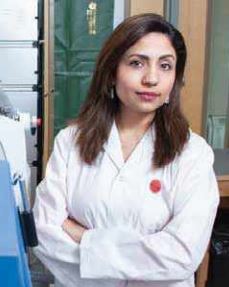
Dr. Elaheh Khozeimeh Sarbisheh (PhD) wants to be a role model for young women in science.
That’s one of the reasons she’s chairing the University of Saskatchewan-Women in Chemistry (USask-WiC) group, which aims to foster an environment in which gender diversity is realized. The group’s goal is to encourage, support and advocate for women and gender minorities, and its members seek to collaborate with undergraduate and graduate students, postdoctoral fellows, staff and faculty members at USask.
“During my PhD studies and my postdoctoral fellowship, I had a chance to supervise several female undergraduate and graduate students. In talking with them, there was always an issue of a lack of female role models pointed out to me, and that they could not picture themselves to be a scientist,” said Khozeimeh Sarbisheh.
“I felt that we can create a member resource group to support women and other underrepresented groups here at USask. Having good role models plays a crucial role in finding the right direction in life.”

Women in Chemistry group at USask.
(Photo by Chris Putnam)
Khozeimeh Sarbisheh is a postdoctoral fellow with the Eric Price Research Group in the Department of Chemistry in USask’s College of Arts and Science. She works with professor Dr. Eric Price (PhD), whose lab is examining how to improve radiopharmaceuticals—the radioactive drugs that can be used to detect or treat cancers.
“I have been interested in cancer research my whole life,” said Khozeimeh Sarbisheh. “Growing up in Iran, I worked as a teen volunteer at a charity that tried to help cancer patients. I saw a lot of patients in a lot of pain. They were saying to me, ‘Why can’t we find a cure for cancer?’ I thought to myself, ‘Maybe I could one day help to get at the root of this problem.’ I thought of going into pharmacy—but if you want to specialize in making drugs, you need to understand chemistry. That’s why I decided to study chemistry and that’s why I am so passionate about my research.”
Khozeimeh Sarbisheh’s passion for chemistry flows into her work with USaskWiC. She started the group in May 2017 with chemistry PhD candidate Kelly Summers, with mentorship from USask professor Dr. Ingrid Pickering (PhD).
There are about 11 USask-WiC members, including master’s student Whitney Shannon. Shannon, who is co-supervised by Price and Dr. Steven Siciliano (PhD), came to USask after earning a Bachelor of Science (honours) degree in chemistry at Mount Allison University in New Brunswick. Joining USask-WiC provided her with an opportunity to get to know other female scientists and to learn from their experiences.
“It was really nice socially,” she said.
Chemistry PhD candidate Moralba Dominguez works with Price and chemistry professor Dr. Christopher Phenix (PhD). Originally from Colombia, Dominguez joined USask-WiC after realizing she was one of the only female chemistry PhD students in her classes and most of the professors were male.
“You feel intimidated in the class, because it’s like when you want to participate you are the only woman,” she said.
Dominguez points out that female students have the same training and knowledge as their male counterparts and went through the same screening process to be able to study at USask. She said being part of USask-WiC has empowered her to say “we are few, but we have the potential to be here.” “We deserve to be here. We’re here because we learned what to do.”

Dr. Elaheh Khozeimeh Sarbisheh (PhD),
graduate student Whitney Shannon and
PhD candidate Josseline Ramos Figueroa are members of the Women
in Chemistry group at USask. (Photo by Chris Putnam)
On March 8—International Women’s Day—USaskWiC hosted a panel discussion on overcoming challenges in STEM (science, technology, engineering and mathematics) fields. Even in 2019, women continue to face biases and barriers in the STEM fields. For example, Khozeimeh Sarbisheh notes working in chemistry “makes having a baby very challenging” for women. “While pursuing their education—especially as a chemist working in a laboratory full of chemicals— they cannot even think about having a baby,” she said. “And, after finishing their PhD and a couple of years of post-doctoral experience—when they are at the beginning of their professional scientific career for most of the women—they are in their mid- or latethirties.”
Groups like USask-WiC are working to address the barriers and discrimination faced by women in science. USask-WiC has already had a number of successes, including providing career-building and networking opportunities through professional development workshops and social events. A highprofile USask-WiC event occurred in September 2018, when the group hosted a conversation at USask called Women Leading, featuring federal cabinet ministers Maryam Monsef and Kirsty Duncan.
USask-WiC is part of the Canadian Women in Chemistry (CWIC) Network, which aims to promote inclusivity, equity and diversity in the chemical sciences by connecting Women in Chemistry groups across the country.
When asked what advice she has for other female scientists, Khozeimeh Sarbisheh said “it is very important to reach out to your peers when you are facing a challenge or problem.”
“I know that many of us, unfortunately, have suffered from the biases on women in STEM fields, but we should remember that we can change this for future generations and, hopefully, for us,” she said. “My advice is that you be the advocate that you wanted to have when you were younger.”
-Shannon Boklaschuk
